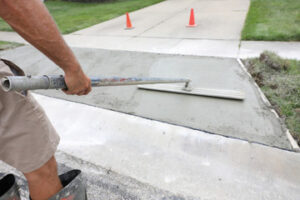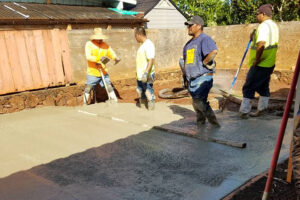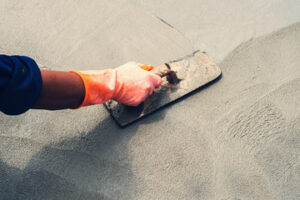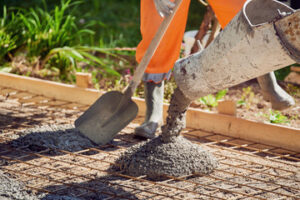Concrete is more expensive than asphalt but lasts longer and requires less maintenance. It is also a versatile material that can be used in many ways. When the water sheen has disappeared from the concrete but before it becomes stiff, float with a magnesium hand float. To reach the middle of large slabs, kneel on boards.
 Choosing a quality concrete construction company for your concrete driveway installation can reduce the risk of cracking. Concrete Contractors Dallas TX can lay the proper foundation, subgrade, gravel, rebar, and formwork before pouring the concrete, which helps prevent future cracking. They can also install expansion joints and grooves formed across the wet concrete at prescribed intervals to allow for natural shifting and settling of the slab without causing it to fracture.
Choosing a quality concrete construction company for your concrete driveway installation can reduce the risk of cracking. Concrete Contractors Dallas TX can lay the proper foundation, subgrade, gravel, rebar, and formwork before pouring the concrete, which helps prevent future cracking. They can also install expansion joints and grooves formed across the wet concrete at prescribed intervals to allow for natural shifting and settling of the slab without causing it to fracture.
Concrete is an extremely durable material that can withstand much weight. It is also a non-flexible material, which means that trucks and other heavy vehicles are less likely to damage the driveway than they might if made of a softer paving material like asphalt. A properly installed and maintained concrete driveway can last up to 30 years and even longer, depending on installation methods, environmental conditions, and temperatures.
Although a concrete driveway can cost more upfront than other types of paving materials, long-term savings can offset this expense. In fact, a well-maintained concrete driveway could last up to 50 years or more, and will still be in good condition when it is time for your family to move out of the house.
A properly installed concrete driveway can last for up to 50 years or more, and will look better than a paved driveway that was not constructed properly. In addition, concrete is an environmentally friendly material that can be recycled and reused to build other structures in the future.
Today’s concrete can be formed into a variety of shapes, textures and colors to enhance the kerb appeal of your home. For example, you can have a concrete driveway that is textured and stamped to mimic the look of brick or cobblestone, which is sure to impress your guests and neighbors. Moreover, concrete can be stained in a wide range of colors, which makes it possible to create a driveway that complements your home perfectly. So, if you are looking for a beautiful and long-lasting driveway that will boost the resale value of your property, then consider getting a concrete driveway installed in Melbourne.
Easy to Maintain
Concrete is a very hardy material that will hold up well to a lot of use. If you take the time to properly maintain your driveway, it will stand up to many years of heavy traffic and weather conditions with minimal damage or deterioration.
The light color of a concrete surface makes it easy to see oil and other fluid spills, so these should be cleaned up immediately to reduce the chance of stains. Likewise, it is important to mop up any large pools of water that form on the driveway after rainstorms, as these can also cause staining and may be an invitation for moss and other unwanted plants to grow.
A concrete driveway can be finished in a number of ways, including adding texture and coloring for a unique look. A stamped or stenciled concrete finish is popular for homeowners who want the look of a traditional brick driveway but would prefer a more durable and low-maintenance material. The design possibilities are endless and the results are stunning.
If you have a concrete driveway, you should be sure to use a quality penetrating sealant on it twice a year to keep the surface protected and looking new. This is a simple, inexpensive step that can greatly extend the lifespan of your concrete driveway.
Like asphalt, concrete can crack over time if not properly cared for. However, if you have your concrete driveway installed by an experienced contractor who ensures the correct steps are taken, this will be avoided. This includes the right mix of cement, optimal weather conditions when the concrete is poured, and strategically placed contraction joints.
It is best to avoid using salt or other ice-melting chemicals on your concrete driveway, as these can cause it to deteriorate over time. A deteriorated driveway can be very difficult to repair, so it is best to prevent this from happening by keeping up with routine maintenance and repairing any cracks or other damage as soon as you notice them. This will keep your driveway in good condition for as long as possible and will help you save money on repairs in the future.
Durable
Concrete is one of the most durable materials available, and when properly maintained a concrete driveway can last 50 years or more. This durability makes it an attractive choice for homeowners and developers alike, as well as anyone who wants to avoid costly repairs and replacements in the future.
Because they are made of a solid material, concrete surfaces require very little maintenance to keep them in good condition. A few quick sweeps with a broom are enough to remove any dirt and debris, while the occasional pressure wash removes deeper dirt or moss. Concrete driveways are also relatively resistant to cracking and can handle a variety of weather conditions, including freezing and thawing.
The durability of a concrete driveway is directly related to its thickness. While a 3- to 4-inch driveway may work for light vehicles, most concrete contractors recommend 10 or more inches of thickness for heavy traffic areas. This is especially important if you plan to store heavy equipment or parking your truck, RV, or other large vehicle in the driveway.
In addition to thickness, concrete also depends on the underlying material for support. For a long-term, durable concrete surface, the contractor must prepare the soil properly to reduce shifting or cracking as it settles. This includes removing any large rocks or other debris, adding soil amendments, or, in some cases, using steel reinforcing.
In addition to its functional benefits, a concrete driveway can add beauty and curb appeal to your home. Manufacturers offer a wide variety of decorative staining, stamping, and engraving options to complement any architectural style. If you are looking for something more unique, you can even have your concrete driveway customized to look like brick, tile, stone, or exposed aggregate. Regardless of the design you choose, a concrete driveway will give your home a beautiful, timeless appearance for years to come.
Versatile
Concrete is a popular choice for driveway construction because it’s durable enough to hold a vehicle. It also comes in a variety of colors and textures, making it easy to customize your driveway to match the style of your home. Plus, it’s relatively inexpensive compared to other construction materials.
Concrete driveways are versatile and can be formed into different shapes to accommodate any type of vehicle. They can also be stained to achieve a wide range of styles. In addition, they are durable enough to withstand freezing and thawing conditions and can be cleaned with a pressure washer. Concrete is also eco-friendly, as it requires less energy to manufacture than asphalt.
In contrast to paver driveways, a concrete driveway is easy to maintain and won’t require any replacement or repairs over time. Although pavers can be more visually appealing than a plain concrete driveway, they can also be difficult to shovel in the winter and create tripping hazards. In addition, they can become loose and need to be re-installed every few years.
A concrete driveway can be installed in a variety of ways, including as a precast slab or poured on-site by contractors. In either case, the proper preparation is key to ensuring that the concrete will last for a long time. If the driveway is poured over dirt, it should be well-compacted before laying the concrete to avoid settlement and cracking. If the driveway is to be on a slope, a geotechnical engineer should be involved in the site preparation process to ensure that the soil can support the concrete.
A well-designed concrete driveway will include control joints at regular intervals to prevent random cracking. It is also important that the concrete be poured with a slump value of not more than 5 inches. The presence of these joints can help to reduce the amount of water that is trapped in the surface, which can lead to a build-up of ice and waterlogged pavement. It is recommended to install a drain at low points in the driveway to remove standing water and direct it away from the pavement.


 Concrete driveways must be reset every few years due to settling, heavy rains, frost action, and vehicles. Concrete driveways require internal and external support to avoid cracking and settling. You can use steel reinforcing and a concrete base made from crushed stone to avoid these problems.
Concrete driveways must be reset every few years due to settling, heavy rains, frost action, and vehicles. Concrete driveways require internal and external support to avoid cracking and settling. You can use steel reinforcing and a concrete base made from crushed stone to avoid these problems.